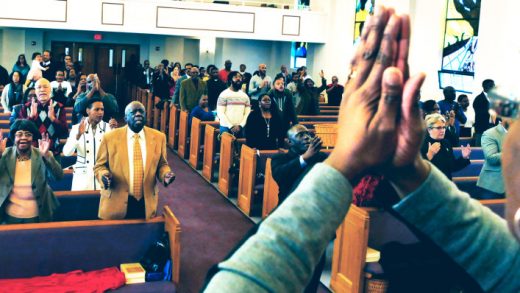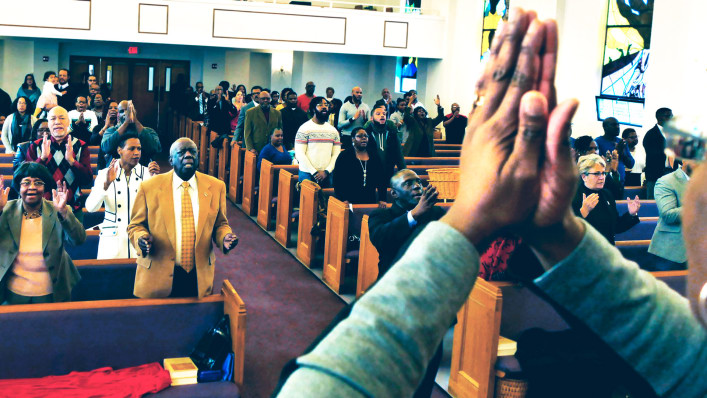How Growing Up In A Black Baptist Church Taught Me The Secret To An Open Work Culture
I grew up attending all-black Baptist churches, but 10 years ago, I found myself visiting a nearly all-white Presbyterian church in downtown Berkeley, California.
It was a large congregation, hundreds in attendance, with a woman minister I greatly enjoyed. But it was so quiet in there compared with my rollicking regular church experience. When prayer ended and I said, “Amen,” out loud, many heads turned my way.
After church, a number of people spotted me as a visitor and stopped by to shake my hand, say hello, and deliver warm welcomes. I mentioned my “amen” faux pas to one woman, and she said, “I know–it’s so quiet in here that my kids call us ‘the frozen chosen.’”
I thought of this incident at an industry roundtable for marketing leaders a few weeks ago. The group of CMOs–mostly from Fortune 500 companies–were sharing their struggles with employee engagement. It was difficult to get employees and company leaders to have honest conversations, they said. Employees didn’t share their ideas, questions, or successes and failures with the rest of the company. One exec mentioned that their employees were too afraid to speak up for fear of being criticized, singled out, or shamed. Several others said they had the same issue. The conversation then moved to internal social media tools, like Yammer and Slack, as possible solutions.
Soon I found myself biting my own tongue. “It’s not a technological problem,” I thought to myself–but didn’t volunteer–“it’s a cultural one.”
What’s Behind The Fear Of Speaking Up
If people are afraid to express their views at work, it’s often because they have reason to be. When people fear sharing their ideas or lessons learned because they don’t want to be singled out, it’s typically because someone else in their company has been singled out–unfavorably–in some way before.
After the marketing roundtable, I mentioned this theory to a close friend who’s worked for a series of very large companies. She said, “Oh yeah, you don’t speak up or challenge leadership. I did that on my first job and was pulled aside and told that was a CLM.”
“A what?” I asked. “A ‘career-limiting move,’” she said.
To me, I see these kinds of employees as the business world’s “frozen chosen.” They’re chosen because they brought some valuable knowledge or expertise to the company in the first place, but have since become frozen because they’re part of an organization where asking questions or pushing back on a planned initiative turns heads–just like the parishioners in the Berkeley church that day.
Open Work Cultures Start At The Top
This is cultural. Black churches have their own set of issues, to be sure. But if there’s one thing that many of them excel in, it’s fostering a culture of conversation. In my experience, a black church service is not a spectator sport. Black pastors are notorious for engaging their audiences in a two-way conversation, expecting (and sometimes even flat-out demanding) audience participation from the first note of the first song to the closing benediction.It’s not for nothing that the saying, “Can I get an amen?” has penetrated the larger lexicon.
But it’s not just an “Amen” that most black church pastors want these days. I’ve heard them make all kinds of requests to parishioners–from asking them to tell their neighbor how great he or she looks today, to filling in the blanks of a not-so-old song by a guy I’ve heard one pastor describe as the “dysfunctional poet-savant Lil’ Wayne.”
Good pastors–and great leaders–foster conversation because conversation fosters engagement. And engagement leads to excellence, joy, creative problem-solving, innovation–you name it.
I would’ve bet that had I spoken up and asked the execs in the room at that roundtable, they’d have told me that they already do everything they can to encourage conversation. But you can’t get people to engage in an ongoing, company-wide culture of conversation just by telling them to do so if the rest of your culture has a chilling effect. Companies need their leaders to demonstrate it. They need to provide reassurance to their employees that being honest will not immediately bring about negative consequences.
Dr. Martin Luther King, Jr. himself could’ve walked into that Presbyterian church on that day in Berkeley, and it would have only turned the pin-drop hush into a momentary mutter at most. Why? Because feedback was simply not a cultural norm in that church. Normalizing real, frank, two-way conversations takes intentional effort, modeling, and the creation of spaces that prove, over time, to be safe harbors for free expression– occupationally and emotionally.
You go first. And second. And fifth, if need be. Leaders should be the first to call themselves out, describe their challenges, conduct public postmortems, and review the lessons they’ve learned. It’s important that those lessons aren’t fake ones, either–they’ve got to be true stories of real things that didn’t go as planned. When you put an idea out there, ask for pushback–literally invite people to show you where you’re missing something or thinking about it wrong.
Ask people for their thinking, for their troubleshooting. Make–then honor–the rule that the best idea wins, no matter whose idea it is. When the project manager’s idea gets road-mapped instead of the CEO’s, make it visible to the employees. When the “frozen chosen” employees begin to thaw and share their ideas, find a way to reward the sharing and thinking, even when you have to adjust their concepts to get them closer to something actionable.
And finally, once people do get more comfortable sharing their thinking, show them consistently that you appreciate them for taking the risk to be vulnerable and express themselves. Allow employees’ free thinking to infiltrate your company’s language, culture, product road map, and editorial calendar. Learn to ask more beautiful questions, in response to employees’ thoughts and ideas. Then ask them.
Then do it all over again. Regularly.
Tara-Nicholle Nelson is the author of The Transformational Consumer: Fuel a Lifelong Love Affair With Customers by Helping Them Get Healthier, Wealthier and Wiser. She is the CEO of TCI, a consulting firm that creates transformational marketing and growth experiences for conscious leaders, businesses + customers.
There are some good lessons for companies to follow.
I grew up attending all-black Baptist churches, but 10 years ago, I found myself visiting a nearly all-white Presbyterian church in downtown Berkeley, California.
Fast Company , Read Full Story
(72)














